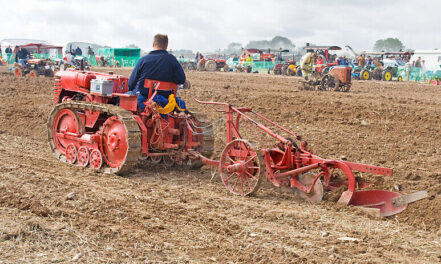
Plough Monday/Sunday
Before industrialisation, Plough Monday was a popular event in farming communities on the first or second Monday of the year, between 7th-13th January. The church had a role from the start and is the source of the modern-day Plough Sunday derivative.
What they share is the blessing of the work of the farm and prayers for good weather. On Plough Sunday, a local farmer may kindly park a big, shiny tractor in the churchyard for a few hours but that is the extent of the ‘entertainment’ ~ unless, that is, you’re in this Essex village:-
Plough Monday, on the other hand, called for singing, dancing and demands for cash donations on pain of having your path ploughed up! This seems to have begun with community-owned ploughs needing annual maintenance. They were stored on church premises during winter and on Plough Monday the priest blessed the plough and lit the church’s plough-light ~ a candle continually kept alight.
The young farm labourers, called Plough Stotts/Bullockers/Jags or Jacks, dressed in gaudy costumes and disguises, and hauled the plough round the village. One dressed as ‘Betty’/’Bessy’ ~ an old woman ~ and collected the money, some of which doubtless paid for drinks at the inn afterwards!
(Top image of British vintage tractor and plough: Tudor Barker at Flickr.com / CC BY-NC-SA 2.0)
